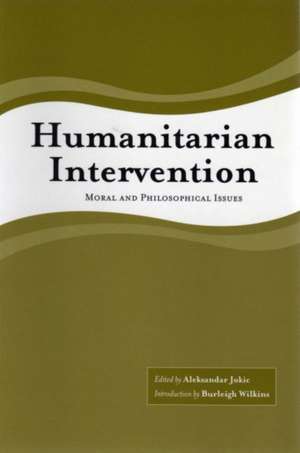Humanitarian Intervention: Moral and Philosophical Issues
Burleigh Wilkins Editat de Aleksandar Jokicen Limba Engleză Paperback – 31 ian 2003
Preț: 337.73 lei
Nou
64.62€ • 67.34$ • 53.51£
Carte disponibilă
Livrare economică 13-27 martie
Livrare express 27 februarie-05 martie pentru 25.34 lei
Specificații
ISBN-10: 1551114895
Pagini: 160
Dimensiuni: 155 x 228 x 9 mm
Greutate: 0 kg
Editura: BROADVIEW PRESS LTD
Locul publicării:Canada
Textul de pe ultima copertă
International law makes it explicit that states shall not intervene militarily or otherwise in the affairs of other states; it is a central principle of the charter of the United Nations. But international law also provides an exception; when a conflict within a state poses a threat to international peace, military intervention by the UN may be warranted. (Indeed, the UN Charter provides for an international police force, though nothing has ever come of this provision). The Charter and other UN documents also assert that human rights are to be protected--but in the past the responsibility for the protection of human rights has for the most part been allowed to rest on the government of the state where the violation of rights occurs. Not surprisingly in this context, the question of what protection (if any) should be provided by the UN or otherwise to individuals when their human rights are violated by their governments or with the complicity of their governments remains a contentious issue. Should the principle of respect for state sovereignty trump the principle of respect for human rights? Historically it has been allowed to do so, but recently it has been more and more widely argued that when states fail to respect the human rights of their citizens (or of others who reside within their boundaries), they may be held accountable for their actions. Is military humanitarian intervention justifiable? And if so, under what circumstances? Those are the questions addressed in this collection of essays.
The focus of the volume is on the abstract principles involved; though reference is sometimes made to specific cases, the essays here consist primarily of philosophical reflection on the abstract issues. (A companion volume on the specific issues surrounding a particular case, Lessons of Kosovo, is being published simultaneously.)

















